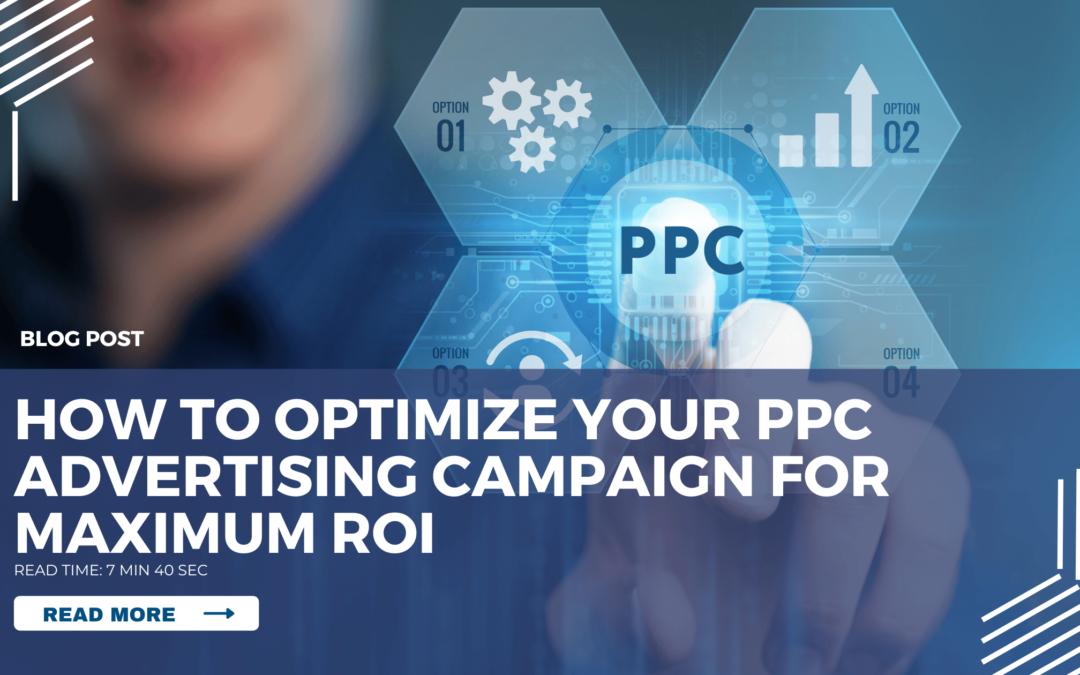Pay-per-click (PPC) advertising has become a popular marketing strategy for businesses looking to drive traffic to their website and increase conversions. While it can effectively reach potential customers, optimizing your campaign to ensure maximum return on investment (ROI) is essential. This article will discuss key strategies for optimizing your PPC campaign and how Darksky Digital can help businesses achieve their goals.
Set Goals and Define Your Audience
Before launching a PPC campaign, it’s essential to have specific objectives to measure the campaign’s success. Setting clear goals and defining a target audience are crucial steps to ensure your investment will pay off. Start by thinking about what action you want users to take when they click on your ad – whether it’s making a purchase, filling out a form, or calling your business. This will help you track your campaign’s effectiveness and give you valuable insight into which adjustments need to be made if any.
Having the right target audience is also vital when running a PPC campaign. Analyzing data such as demographics, spending habits, and geographical locations can help you identify whom you should target with your ads. Knowing whom you’re contacting will enable you to create tailored messages for them and ultimately increase conversions. Additionally, using key metrics like cost-per-click (CPC), cost-per-acquisition (CPA), and return on investment (ROI) can provide more concrete information about the performance of your campaigns.
To make sure everything runs smoothly:
- Create an organized system for tracking all the data related to your PPC campaigns.
- Ensure each ad has its unique tracking code so performance metrics can be easily analyzed and reported.
- Consider testing different types of ad copy and formats to determine which ones generate the best results for your business.
- Remember to keep tabs on changes in consumer behaviors or trends, as these can impact the effectiveness of your campaigns over time.
By setting clear goals, defining an appropriate target audience, tracking metrics, and making necessary changes along the way, businesses can maximize returns from their PPC campaigns while ensuring resources are being used efficiently and effectively.
Defining your target audience will help you create more targeted ads and improve your conversion rate. Consider your target audience’s age, location, interests, and search habits.
Conduct Keyword Research
Keyword research is an essential step in improving the performance of your PPC campaign. It involves understanding the words and phrases that users are typing in when they search for products or services related to yours. You can use keyword research tools to identify high-volume keywords with low competition, maximizing your visibility while keeping your cost per click (CPC) low. You can also use these tools to analyze trends over time, allowing you to stay ahead of any significant changes in user behavior. Furthermore, incorporating long-tail keywords into your campaigns is another great way to optimize for organic search traffic and target more qualified prospects.
Beyond researching broad terms, it’s also essential to focus on intent. With the emergence of voice search and other contextual technologies, people increasingly ask direct questions – such as “where” and “how” – when conducting voice searches. Therefore, including these types of queries within your keyword research strategy is also essential. Additionally, ensure you take advantage of valuable opportunities by using local modifiers like city names or postcodes to capture more localized searches.
By leveraging keyword research strategies effectively, you can ensure that your PPC campaigns are reaching their full potential. Doing so will enable you to be seen by more relevant users and drive better returns for your business overall.
Create Compelling PPC Ad Copy
Creating successful ad copy is vital to any effective digital marketing campaign. Knowing who your target audience is and what keywords they are searching for is the first step in crafting a message that will capture their attention and entice them to click. Your ad should be clear, concise, and relevant to the user’s search query. Furthermore, include a call to action encouraging users to take the desired action, such as “Buy Now” or “Learn More.”
Using language that resonates with your target audience is essential when creating ads. Think about how you can inject humor or emotion into your copywriting to capture their attention and elicit a response. It would help if you also considered using persuasive techniques such as appealing to the user’s ego or offering an incentive such as free shipping or a discount code. Additionally, it helps if you can provide evidence of why they should purchase from you over competitors – such as through customer reviews or case studies of successful outcomes from using your product or service.
Compelling ad copy aims to generate clicks and ensure conversions when the user lands on your website. Ensure the message on your landing page follows up with what was advertised to maintain trust with potential customers and encourage them to take action toward purchasing from you. With engaging copywriting coupled with detailed information about your product or service, you can create compelling ads that will help drive conversions and increase sales for your business.
Optimize Landing Pages
When creating an online advertising campaign, the page users are directed to after clicking on an ad is just as important as the ad itself. Ensuring the landing page is relevant to the user’s search query and includes a straightforward call to action is essential. The page should be easy for desktop and mobile users to navigate quickly, with features like button-based navigation and menus at the top.
Including concise, informative content on your landing page is vital. For example, if you’re running an ad for a product or service, consider adding details about its features and customer reviews. Additionally, highlight a clear promotional offer (such as discounts or free shipping) to encourage customers to complete their purchases without hesitation.
To create a successful landing page experience for your audience, use various visual elements like videos and infographics — these can help engage visitors and make them more likely to stay on the page longer. Responsive design techniques are also wise, so your content looks great across different devices and browsers. Finally, don’t forget about SEO best practices — include headlines and meta descriptions in your pages, so they appear in search engine results.
By considering all of these considerations when designing your landing pages, you’ll be able to deliver an excellent experience that helps convert leads into customers.
Monitor and Adjust Your PPC Campaign
It’s essential to regularly assess your pay-per-click (PPC) campaign and make appropriate adjustments. Utilizing analytics tools can help you keep tabs on your ad success and allows you to modify your bidding strategy and ad copy as needed. Additionally, evaluating diverse advert versions through A/B testing is a great way to determine which performs best. All of this should be conducted to optimize the effectiveness of your PPC efforts.
However, it’s not just about identifying what works or needs tweaking; it is also essential to understand why something works or needs amendment. It would be best if you always strived for higher click-through rates (CTRs), more conversions, and reduced costs associated with user acquisition. To attain these objectives, there are several measures you can take, such as giving careful consideration to the relevance of keywords used in your PPC campaigns, refining specific targeting parameters, and experimenting with different messaging tactics across all platforms.
Moreover, analyzing the results of your campaigns at regular intervals is critical. It allows you to pinpoint areas that need improvement so that you can make necessary changes promptly. This could include identifying high-performing ads or reallocating the budget to campaigns with better potential for return on investment (ROI). Additionally, if the budget allows it, try aggressively increasing bids for targeted keywords or expanding into additional channels where suitable opportunities exist.
In conclusion, keeping track of all the elements involved in running a successful PPC campaign is vital to maximizing its ROI. Therefore implementing effective strategies based on data from analytics tools will allow you to make crucial modifications to produce better outcomes from your PPC endeavors.
How Darksky Digital Can Help Maximise Your PPC Campaigns
Darksky Digital is a full-service digital marketing agency helping businesses optimize their PPC campaigns for maximum ROI. We offer a range of services to help companies to achieve their goals, including:
Keyword research:
Our keyword research process maximizes visibility and minimizes your cost per click. We use advanced tools to uncover high-volume keywords with a low, competitive landscape, allowing you to achieve maximum exposure at minimal expense. Our sophisticated search engine algorithms dig deep into the web, uncovering valuable insights that can help you refine your search terms, capitalize on industry trends, and take advantage of seasonal opportunities. With our expertise, you can pinpoint which keywords are most likely to bring in high-quality leads and convert those leads into paying customers.
Ad copywriting:
Our expert copywriters craft compelling ad content to grab your ideal customer’s attention. Using persuasive language and an engaging tone, we strive to motivate them to take action according to their goals. We use precise wording and dynamic images to create a compelling message that resonates with the audience and inspires them to act on it. Our team has years of experience crafting clear ad copy that speaks directly to your target demographic while delivering key messages in an impactful way.
Landing page optimization:
We optimize your landing pages to deliver the best user experience possible. Our goal is to ensure that the page is relevant to the search query, loads quickly, and has a simple navigation system – optimized for desktop and mobile devices. We use sophisticated algorithms and techniques to ensure users find what they need quickly and efficiently while providing a pleasant browsing experience. Additionally, our optimization process considers factors such as page speed, content relevance, and ease of navigation, all creating a positive overall impression with potential customers. Our in-depth analysis guarantees that your landing pages will draw in more traffic and convert more leads than ever.
Campaign monitoring and adjustment:
At the core of our PPC management services, we monitor your campaigns regularly to ensure maximum return on investment. Our team of experts analyzes campaign performance data, identifies areas for improvement, and makes necessary adjustments to maximize effectiveness. We consider keyword selection, budget allocation, bid prices, and ad placement to optimize click-through rates and reduce cost per click. Our team also use A/B testing strategies to determine which ads perform better and continually refine campaigns for peak performance. We aim to generate more leads, drive conversions and get the most out of your PPC budget.
In addition to PPC optimization, Darksky Digital offers various other digital marketing services, including search engine optimization, social media marketing, and content marketing. Our team of experts has years of experience helping businesses of all sizes achieve their marketing goals. We are committed to delivering results that exceed your expectations.
Conclusion
Optimizing your PPC campaign is crucial to achieving maximum ROI and driving business growth. You can create a highly effective PPC campaign that drives traffic and conversions by setting clear goals, defining your target audience, conducting keyword research, creating compelling ad copy, and optimizing your landing pages.
For more tips and information, follow our Facebook, Instagram, and LinkedIn pages.

